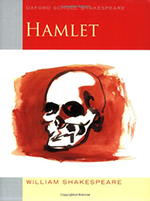|
A College-Bound Intensive — Online Classes
 Shakespeare's Hamlet Shakespeare's Hamlet
Bringing Shakespeare to life
[Our son] has had many previous classes, including several theater performances, on Shakespeare's works. None of those previous experiences compare with the opportunity he has had with your classes. The deep, intelligent examination he has had with you has created a new level of engagement for him.
— A homeschooling mom
I really liked the close reading. The text really gained much more meaning when it was broken down and explained in greater detail. Also, it was surprising to see all the film productions of Hamlet that exist—each was different and strong in certain areas. I did not expect to see so many interesting film clips and enjoyed watching them.
— A recent student
Annotating paid off in this class. [When reviewing my copy of the text], I was able to glance at a passage and remember its contents easily because of my annotations. This is something I will definitely apply in future studies.
— A recent student
This online series provides an in-depth study of the play some consider Shakespeare's greatest. For students, Hamlet can seem daunting — it's Shakespeare's longest play; its themes are dark; its ideas are complex; its verse can be difficult. But this series solves a mystery at the heart of the play: it unveils historical information that unlocks the play's secrets — the story, the characters, Hamlet's actions all suddenly make perfect sense. In this course, Hamlet serves as an object lesson in the importance of cultural and historical context to understanding and appreciating great works of literature.
By the end of the series, students will be able to read Shakespeare's more difficult plays on their own. The whole experience is designed to bolster their confidence with a wide range of difficult texts.
In high school I took an in-depth study of Shakespeare's "Hamlet" with Roy Speed. His teaching style is interesting, engaging, and humorous, and I always looked forward to class. I especially enjoyed learning how to pull apart a text and analyze it, as well as mastering Shakespeare's vocabulary and learning historical facts about the time period.
As an engineering student in college, I continue to read difficult texts for pleasure and am able to write well, whether it's a research paper or a technical writing piece. These skills are due to the analytical methods Mr. Speed taught me.
Elizabeth T., student
Space is limited; registration reserves your student's place.
Instructor: Roy Speed. (Learn about Roy here.)
Course details
 Who should attend: This is a high school-level course, and students should already have some familiarity with Shakespeare. Who should attend: This is a high school-level course, and students should already have some familiarity with Shakespeare.
Our own intensive on Romeo & Juliet is ideal preparation for this course.
Fee: $325.
Required text: Students must purchase separately the edition of the play used throughout these sessions: Hamlet: Oxford School Shakespeare. This edition has been selected for its suitability for teens and the accessibility of its explanatory notes.
Recorded sessions. Sessions will be recorded and available to all registered students.
What your student gets
Included with enrollment in Hamlet:
- Online classes with live instruction. Live lessons that engage students through lecture, close examination of text, audio, video, graphics, and interactive discussion.
- Secure access. Upon registration, the student will receive an email providing secure access to the classes. Roughly two weeks before the class start date, your student will be contacted with course guidelines and other essential information.
- Access to recordings of each session. If students cannot attend one of the live sessions, they may view the video recording of the lecture at a time convenient for them.
- Materials. Downloadable materials that can be printed and used throughout the series.
- Written assignments. This course does not require a lot of writing; it is primarily a course in close reading, analysis, and discussion. Nonetheless, in the second half of the series, students are given an intricate analytical challenge: they're invited to examine historical evidence relating to Hamlet's composition — i.e., scant and often ambiguous evidence on dating Shakespeare's writing of this play — and they must then draw up with their own arguments for when the play was most likely written.
In addition, a final quiz will be available for the parent to administer, to support generating a grade.
- Grade & course credit. Parents may 1) award their student a 0.33 English credit for honors-level coursework, and 2) generate a grade for his or her transcript. A detailed course description is provided for the student's records.
More comments from students & parents
These classes make use of questions (open ended, leading, and probing in turn), carefully selected references, alternate viewpoints that students are helped to evaluate, judicious parsing of the play, and lovingly selected background materials. Roy's phenomenal communication skills, his clear speaking voice, his enthusiasm, his love of the material, and his ability to make things fun are icing on the cake. This experience has helped further mature my sons' thinking skills.
— Amanda H., parent
Roy Speed is very knowledgeable of Shakespeare, and his appreciation for Shakespeare is contagious. When sharing the lines he finds meaningful, beautiful, or humorous, he invites his students to experience Shakespeare in a deeper way. He encourages active participation, first, by modeling thoughtful discussion of the characters, the plot, and Shakespeare's style, and then he expects insightful and thoughtful answers to the questions he poses to his students.
— Vicki B., parent
Roy Speed has taught several classes to my homeschooled children over the years, and we all have been very pleased. He is not only witty and engaging, but passionate about what he teaches. His classes have truly ignited in our students a deep interest in delving into difficult texts, to not only look at writing in the traditional fashion of simply consuming information as a functional process, but to learn to annotate a text, dig much deeper into a piece of writing, and become an active participant in the reading.
Karen T., parent
|
|
|
2026-27 registration is open!
Wednesdays, Dec 2 – March 10
3:00 – 4:30 pm EST
Eleven sessions of 90 minutes each.
Holiday break:
No class Dec 23, Dec 30, or Jan 6
Series resumes on Jan 13, 2027
Also: No class on Feb 24, 2027

Fee for this intensive: $ 325.
Questions? — Contact the instructor here.
Excerpt from a live class
Hamlet — The opening scene
Also open for registration:
This series comprises seven sessions on Shakespeare's shortest tragedy. Macbeth shows what happens when a man with a conscience commits murder. It is an astute portrait of psychological unraveling, and students in this course will study in great detail not just the characters' psychology, but the play's remarkable imagery and verse.
College-Bound Intensives
The instructors for our College-Bound Intensives are all subject-matter experts with a passion for their fields. They're selected for their ability to instill in their students real love and intellectual excitement for the subjects they teach.
Wrestling with difficult texts
A chasm separates middle school from high school or college-level work. Faced with advanced texts in science, history, and literature, students can no longer read passively; they must be active readers, digging into the content for nuance and understanding.
Our College-Bound Intensives are programs designed to build skills crucial for college-level work. Through intensive study of great authors, these courses take students to an advanced level of reading comprehension and analysis, enabling them to:
- tackle sophisticated material across the spectrum of the college curriculum;
- dissect difficult passages included in standardized tests.
In the process, students expand their vocabulary, strengthen their facility with complex ideas, and deepen their understanding of what makes great writing great.
Great works, important skills
We had a number of reasons for creating the College-Bound Intensives:
- Few homeschooling parents feel equipped to teach the works of great authors — like Shakespeare — but may feel nonetheless that such works should figure prominently in their own curriculum.
- Plenty of courses now target the student's performance on tests required for acceptance at college; fewer courses seem to target the student's performance in college — i.e., by providing knowledge and skills critical to a successful college career.
|
|
![]()